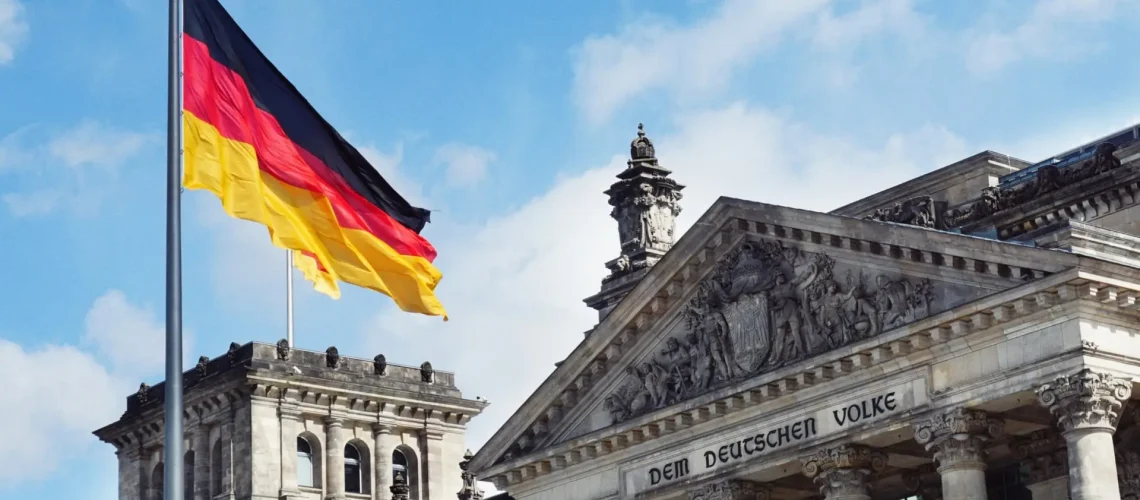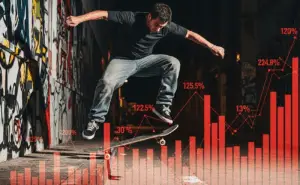The following article may sound like a conspiracy theory, but those who know me are aware that I have a deep aversion to conspiracy theorists and other extremists. I believe and still hope that the transformation and adaptation will come from the moderate political center in the future, without the necessity of (again) going through extremism to improve our system.
After decades of stability, both our political and economic systems seem to be reaching their limits. The existing geopolitical world order is shifting, affecting our position in the world as a strong, liberal, and democratic Germany—a guarantor of stability in Europe. There is also much movement on the domestic front.
Despite Germans, compared to the rest of the world, even the United States, complaining at a very high level, they seem to believe that they are doing poorly—just because they can no longer maintain their very high standard of living. Many Germans are unaware that much of this standard of living was built on the exploitation of Third World countries and their populations. However, this uncomfortable truth is sometimes dismissed as socialist or communist—a political worldview with which I also cannot identify.
In my opinion, our current economic system cannot continue to function and is on the verge of ultimate collapse. A system designed to generate profits for owners and shareholders will eventually reach its limits. A friend who is an investor may disagree with me, claiming that these are the “normal cycles” of the economy. A bull market is followed by a bear market, and after the peak comes a low. He firmly believes that there will be another peak worldwide in 1-2 years. God willing!
But what if not? The gaps between the curves of the graphs indicating the highs and lows of the world economy are narrowing. It seems that we are on the verge of a heart attack.
Countries with low production costs are undoubtedly at an advantage compared to Germany or Europe, even if they cannot yet reach the quality of our services and products. The German consumer also has less money in their pocket and buys cheaply produced goods from abroad. They think more short-term, and the lifecycle of products is getting shorter, which is not necessarily sustainable and poses massive problems for our environment, but is also detrimental to our national economy.
Back to Germany and Europe: The population is afraid. The decline in living standards and stability is clearly visible and palpable. The pension system (the young pay for the old) cannot function with declining birth rates and longer-lived elderly people and is also on the verge of collapse.
People in Third World countries, whom we exploited in the past during colonialism and post-colonialism, are now part of our interconnected global society. They own smartphones on which they can watch soap operas from the First World, depicting the abundance in which we live. The residents of the Third World do not see that much of it is a scripted fairy tale or has been going downhill for decades. Moreover, even a Europe in an economic downturn seems better than their lives. The emphasis is on “seems” because only a few immigrants will manage to achieve a stable and normal standard of living in Europe, if they manage to get through the desert, past human traffickers and extortionists, greedy smugglers, and across the Mediterranean or the Atlantic.
The rest of the world wants to partake in the supposedly fantastic life in Europe. They also want to sip milk and honey from the streams below Neuschwanstein Castle and enjoy their lives. Europe could use some people to do lowly jobs that a European considers beneath them. Apart from that, the new immigrants contribute to pension funds and finance the elderly. The increasing immigration numbers also scare Germans and Europeans. There is fear of foreign cultures and their influence on ours. Some already see the Ottomans or Arabs coming back to Europe and establishing their caliphate, with only 4 million Muslims in Germany. Of course, immigrants bring not only willing and good people but also lazy, stupid, and criminal ones, unfortunately, including the occasional misguided extremist. This seems unavoidable.
Fear provides the ideal breeding ground for radical ideas. In advertising, a copywriter quickly learns that working with emotions is essential to package a sales strategy into a story. You either work with people’s dreams or their fears. Politics also involves advertising, and campaign methods are similar. Do you want a better, cleaner, climate-neutral Germany? Then vote… Are you afraid of the Black African who drunkenly harasses your wife? Then vote…
Asymmetrical warfare, allegedly developed by General Gerasimov in Russia, the current Chief of the General Staff of the Russian Army, is said to involve influencing the population to achieve strategic goals. This can be achieved through media influence or mass troll posts, or, as seen in the last Trump election in the USA, by using regular advertising channels to influence the society of another opposing state. Foreign states, as well as individuals, have been influencing our society through various channels for decades to achieve their goals. If one mentions Russia in this context, with its trolls, RT, or even influencing political parties, one must also mention the USA, which pays lobbyists and also influences our media through state-affiliated and funded foundations and organizations. China, India, and some Muslim states could also be mentioned. One would then also have to ask: Who funds the mosques and Islamic associations and organizations in Europe?
Recently, I sat by the campfire in the evening with an old friend from the USA. He officially worked for the State Department, the US Department of State. A diplomat. Some may even suspect that he worked for a service of the USA with external impact. Now, in retirement, my friend still seems to have access to information and files with analyses. When we turned to the topic of Germany after a few beers, my friend’s face darkened. He could not make optimistic predictions. In the following discussion, he painted a bleak picture of Germany. The current economic crisis is not manageable by the red-green government, and Germany will not get out of the trough for the time being. This inevitably leads to Germany becoming politically, socially, and politically destabilized. The population has lost trust in the major mainstream parties and will turn to some more extreme fringe parties. He already sees the AfD as the majority party in the Bundestag in 2 years. At the latest, in 6 years, in the next election, the AfD will emerge as the winner and majority party. Furthermore, he continues, this does not bode well. The AfD has no experience in governing and will make essential political and economic mistakes, plunging the country even further into misery. Not to mention the anti-European and antidemocratic tendencies of parts of the party.
So, it doesn’t look good. As I write this article, there is a ruling from the Federal Constitutional Court in Karlsruhe, declaring Chancellor Olaf Scholz’s (SPD) budget structure unconstitutional. In the budget for 2023 (which is almost over), there is a hole of 60 billion euros. The chancellor is called a “trickster” in the press. The finance minister from the FDP doesn’t look much better, and the Greens have already lost the Germans with their almost radical approach to change. It seems they have seen the end coming and are trying to push through as much as possible before. Is the vote of confidence coming now? The upcoming new election could already boost the AfD and Sarah Wagenknecht’s new party in the Bundestag.
At the same time, there are increasing speculations and accusations that
the AfD and Sarah Wagenknecht’s parties have long been on Putin’s payroll and receive money and support from Russia through indirect channels. In return, these parties currently criticize Europe’s and the German government’s Russia policy. A coalition of Sarah Wagenknecht’s party and the AfD is also conjured up. Although the parties are on the left and right fringes, there are programmatic overlaps, and Russia’s goals in Europe are strangely in the midst of this intersection of both parties. Among other things, a departure from the EU and an approach to a Eurasian space. In the 2016 US election disruption, Russia did not expect to be so successful in bringing “their” presidential candidate to power. It was, as it is in Germany and Europe, about disrupting political peace and destabilizing democracy. Because if politicians are busy with domestic and European problems, as the Kremlin strategists calculate, they have no time to focus on Russia and its actions in the world (Africa, South America, Asia, or even Moldova, Serbia, and Kosovo). Not to mention the war in Ukraine.
We must now ask ourselves how to proceed at this point. Yes, we probably can no longer trust the mainstream parties, and we have been choosing the lesser evil for years. But do we now want to hand over the reins to fringe parties with sometimes extremely radical views and naively trust that they can navigate us through the storm? Do we want to continue allowing other states to exert influence on our press, our parties, and thus on our society? After all, we don’t allow the Chinese or Iranians to put pressure on critics of the system in Germany, do we? In the end, we are all in the same boat and must find a solution together. Although, maybe I will have to pack my bags again and move elsewhere because living under conservative right-wing rule (even if it is possibly only temporary) is not acceptable to me.






